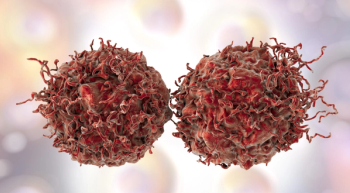
A post-hoc analysis of the phase 3 ARCHES found enzalutamide plus androgen deprivation therapy to be an effective treatment for patients with metastatic hormone-sensitive prostate cancer, no matter their history of prior local therapy.

A post-hoc analysis of the phase 3 ARCHES found enzalutamide plus androgen deprivation therapy to be an effective treatment for patients with metastatic hormone-sensitive prostate cancer, no matter their history of prior local therapy.

Patients with locally advanced muscle invasive bladder cancer may experience superior benefit from gemcitabine and carboplatin if the chemotherapy is co-administered with vitamin c.

Loyda E. Braithwaite, MSN, RN, AGPCNP-BC, AOCNP, highlights nursing considerations in prescribing and administering endocrine therapy to patients with HR+ breast cancer.

Entrectinib elicited encouraging responses in patients with breast cancer that harbors NTRK fusions, according to updates from the phase 2 STARTRK-2 trial.

Phase 2 trial findings indicate that cabozantinib plus nivolumab may be effective in treating patients with non-clear cell renal cell carcinoma with papillary histology.

Patients with clear cell renal cell carcinoma experienced reduced levels of hypoxia inducible factor-2 alpha expression following treatment with ARO-HIF2.

Conversations surrounding fertility preservation may differ between young men and women with cancer, according to Donna Herrera Bell, MSN, APRN, FNP-C.

Kate Sandstrom, MSN, APRN-BC, AOCN, discusses the importance of including the radiation oncology team in a patient’s long-term care plan.

Oncology nurses at the 2022 ASTCT Meeting shared how a peer-to-peer observation and validation tool helped decrease central line-associated bloodstream infections by 68%.

Unrelieved stress may contribute to cancer-related cognitive impairment and anxiety in patients undergoing chemotherapy.

In the age of cyberattacks, establishing and practicing a downtime procedure is crucial to safeguard patient care, according to Kelli-Ann Mancini, MSN, RN, OCN.

Patients with HER2-positive breast cancer who also have brain metastases experienced clinical benefit with fam-trastuzumab deruxtecan-nxki in the phase 2 TUEXEDO-trial.

Older men who have received androgen-deprivation therapy are an increased risk of heart issues, however, the root of the risk is still not well understood.

Cognitive therapies were found to be effective for helping cancer survivors with insomnia, but more research is needed for patients actively receiving treatment.

Oncology nurses may be able decrease peripheral access wait times for patients, however, a change in culture may be necessary to see full results.

Jessica MacIntyre, ARNP, NP-C, AOCNP, discusses empowering oncology nurse navigators to refer patients undergoing chemotherapy or radiation therapy to nutrition services.

Single nucleotide polymorphism (SNP) genotyping could be used to predict radiation dermatitis in patients with breast cancer.

Fam-trastuzumab deruxtecan-nxki is now an FDA-approved regimen for the treatment of patients with unresectable or metastatic HER2-positive breast cancer.

Increasing the number of intravenous port nurse champions across a health care system helps to keep oncology nurses with their patients and reduce care delays.

The FDA has granted a priority review designation to darolutamide plus docetaxel for patients with metastatic hormone-sensitive prostate cancer.

The death doula is a unique role that can help oncology care teams improve the quality of end-of-life care delivered to patients.

Two oncology nurses with Allegheny Health Network discuss how they guide patients through their diagnosis, treatment, and life after cancer.

The addition of apalutamide to androgen deprivation therapy does not lead to a significant patient-reported side effect burden nor a reduction in health-related quality of life in patients with metastatic castration-sensitive prostate cancer.

Patients with cancer were reported to have mixed expectations with immunotherapy as part of their oncology treatment.

The addition of ublituximab and umbralisib (Ukoniq; U2) to ibrutinib (Imbruvica) demonstrated a 77% undetectable minimal residual disease (uMRD) rate in patients with chronic lymphocytic leukemia.

Laura Zitella, MS, RN, ACNP-BC, AOCN, discusses third-line treatment options for patients with diffuse large b-cell lymphoma.

Point-of-use shower filtration may be an effective strategy in reducing waterborne pathogens and protecting patients who underwent stem cell transplant from infection.

A patient-friendly stoplight tool with 3 different colored zones helped patients undergoing chemotherapy manage diarrhea and reduce hospital and emergency department visits.

Patients who receive medical cannabis in addition to standard opioids may require less overall opioid treatment to manage their pain.

Specialty nurse practitioners can help tailor pain management programs for patients with sickle cell disease and decrease hospital stay times.